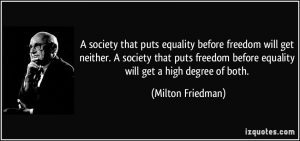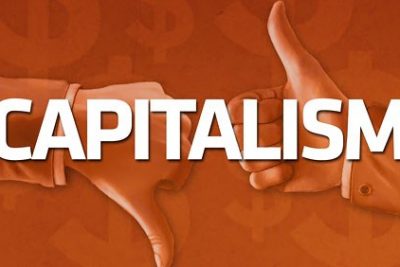We would like to thank our friends from XLRI for their entry. It was an interesting and pleasing read, more so because most of it just complemented the point that we were making through our own entry- that capitalism is essential for the healthy survival of any economy. Hence, we wouldn’t call it a rebuttal of their post, rather an extension of both of our entries with some difference of opinion regarding certain points mentioned by our friends.
As their entry rightly points out, capitalism is the free-market system that promotes innovation, encourages talent and economic growth. It also mentions how socialism and communism sound very good in theory, but are impractical in the real world. That is the reason capitalism has emerged as the dominant economic form across most nations, with countries like Sweden which was the perfect model of socialism also switching to a more free-market economy.

Our friends however claim that capitalism promotes inequality and hence is undesirable in the greater scheme of things. Here, we would like to make a clear distinction between the actual and perceived motive of capitalism. Free-market economics is perceived to be driven by greed which aims to aid economic disparity by our friends here. This view gets both the problem and its solution all wrong. Free-market economics is not about dividing up a dwindling pie, but expanding the pie to serve everyone. It is about hard-work and the opportunities created by a free market economy. Those who succeed do not do so at the expense of others

Government has a supporting role to play in this system. It must, for example, uphold the rule of law, secure property rights, ensure access to education, and provide a safety net for those who cannot care for themselves, but the focus remains on the individual and his efforts to rise and help those around him do the same. Given the diversity of individual efforts, not all will succeed. Unequal results are a natural outcome of equal opportunity.
As far as the fear of monopoly is concerned, most monopolies exist because it is more efficient for a single firm to exist in that market due to economies of scale and it is the role of the government to ensure that the people are not unduly exploited by the firm. For most industries, the existence of above normal profits in the market act as the incentive to ensure adequate new entrants and hence a more competitive market which ensures wider variety and better quality of goods at the lowest price.
Moreover, one should focus more on economic mobility rather than economic inequality. In an economy like US which works on the free-market model, the recent rise in income disparity has not caused a decline in upward mobility. Standards of living have increased for everyone—as have incomes—and mobility, however one measures it, remains robust. Simply put, how much the top 1 percent of the population earns has no bearing on whether the bottom 20 percent can move up.
Imagine resurrecting an American ancestor from the year 1700 and showing him a typical day in the life of Bill Gates. The opulence would obviously astonish the ancestor, but the features of Gates’ life that would make the deepest impression are that he and his family never worry about starving to death; that they bathe daily; that they have clean and healthy teeth; that diseases such as smallpox, polio, present no substantial risks; that the Gates’ work week is only five days and that the family takes several weeks of vacation each year; etc. In short, what would likely most impress a visitor from the past about Bill Gates’ life are precisely those modern advantages that are not unique to Bill Gates–advantages now enjoyed by nearly all Americans. He would also likely find the wealth differences between ordinary Americans and the richest Americans trivial compared to the differences between most pre-industrial folk and the royalty who ruled them.
The fact is, material benefits enjoyed in the past only by the superrich are, in today’s capitalist societies, enjoyed by nearly everyone. This undeniable fact demolishes accusations that capitalism creates inequality.
Having presented our argument opposing the inequality promotion aspect of capitalism as suggested by our friends, we now move on to the hybrid economy model suggested by them. While agreeing to the point about the success of the hybrid economies, we would like to point out that these economies take Capitalism as the base and there is some government regulation added to it, not the other way round. Hence, even in the model proposed by our friends, the basis for economic activity is the capitalist model of economics.
Our friends have further described the new models which apparently seek to strike a better balance between economic growth and social development. However, we would like to say that there have been multiple models over hundreds of years suggested by the critics of capitalism, with the strongest ones being socialism and communism but none of them have been able to survive practically in the long run.
The Economic democracy model described by our friends here suggests that the means of production be controlled by the workers as a whole and the surplus after paying a nominal rent for the ownership be distributed equally amongst the workers. Again this model sounds good on paper, but is likely to be very inefficient and unstable in reality, as granting the control of resources to the workers will give them too much power. Moreover, the equal division of surplus without any incentive on working harder will promote the tendency to free-ride. Also, giving the owners/entrepreneurs control over only limited resources will reduce the incentive to innovate and compete. While our friends have conceded that the models are nascent and lack credibility, they have claimed the models to be implementable and better, which doesn't seem to be the case.
Taking the Indian example, our friends have pointed out that India has suffered from mismanagement of resources and corruption to which we agree but would like to add that all these issues are primarily associated with the state owned organizations, the more “socialist” organizations. The expansion of the free-market set-up after the 1991 reforms has brought about a lot of positive changes but there is a long way to go which passes through an economic set-up with higher market freedom.
So, through our response we would like to point out that the so-called cooperative model suggested by our friends is not different from capitalism, but is in fact, another facet of the dynamic capitalist adapted to the changing needs of the current economic scenario which will keep on evolving further in the times to come.
Theme picture source -
www.american.com
Picture 1 source -
www.last.fm
Picture 2 source-
http://coloradoright.wordpress.com/2013/12/26/socialism-capitalism-and-breadlines/
Picture 3 source -
http://unixdude.blogspot.in/2012/11/socialist-vs-capitalist.html
Picture 4 source -
www.funnyjunk.com
Picture 5 source -
http://pearlsofprofundity.wordpress.com/2013/06/20/capitalism/
This post is a formal entry for the InsideIIM Debate, Battle #5
Team Name:
Twisted Minds
Team Mate:
Reshal Jain
Institute:
IIM Lucknow
Read the original argument by
XLRI Jamshedpur here




